| |||||||||||||||||||||||||||||
1,990 delegates to the 1980 Republican National Convention 996 (majority) votes needed to win | |||||||||||||||||||||||||||||
|---|---|---|---|---|---|---|---|---|---|---|---|---|---|---|---|---|---|---|---|---|---|---|---|---|---|---|---|---|---|
| |||||||||||||||||||||||||||||
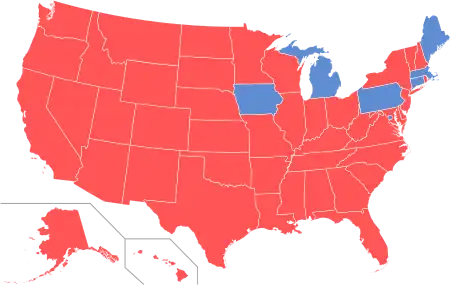 Red indicates a win by Reagan, blue a win by Bush. | |||||||||||||||||||||||||||||
| |||||||||||||||||||||||||||||
From January 21 to June 3, 1980, voters of the Republican Party chose its nominee for president in the 1980 United States presidential election. Retired Hollywood actor and two-term California governor Ronald Reagan was selected as the nominee through a series of primary elections and caucuses culminating in the Republican National Convention held from July 14 to July 17, 1980, in Detroit, Michigan.
Background
As the 1980 presidential election approached, incumbent Democratic president Jimmy Carter appeared vulnerable. High gas prices, economic stagflation, a renewed Cold War with the Soviet Union following the invasion of Afghanistan, and the Iran hostage crisis that developed when Iranian students seized the American embassy in Tehran all contributed to a general dissatisfaction with Carter's presidency; his job approval rating sank to below 20 percent in late-1979 as a result. Consequently, the president faced stiff Democratic primary challenges from Massachusetts Senator Ted Kennedy and California Governor Jerry Brown. A large field of Republican challengers also emerged.
Candidates
Nominee
| Candidate | Most recent office | Home state | Campaign
Withdrawal date |
Popular vote | Contests won | Running mate | ||
|---|---|---|---|---|---|---|---|---|
| Ronald Reagan |  |
Governor of California (1967–1975) |
 California |
 (Campaign • Positions) Secured nomination: May 24, 1980 |
7,709,793 (59.79%) |
44 | George Bush | |
Withdrew during primaries
| Candidate | Most recent office | Home state | Campaign
Withdrawal date |
Popular vote | Contests won | ||
|---|---|---|---|---|---|---|---|
| George H. W. Bush |  |
Director of Central Intelligence Agency (1976–1977) |
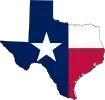 Texas |
Campaign Withdrew: May 26 (endorsed Ronald Reagan, nominated for Vice President) |
3,070,033
(23.81%) |
8
CT, DC, IA, ME, MA, MI, PA, PR | |
| John Anderson | .jpg.webp) |
U.S. Representative from Illinois (1961–1981) |
 Illinois |
Withdrew: April 24 (ran as independent) |
1,572,174
(12.19%) |
None | |
| Howard Baker |  |
U.S. Senator from Tennessee (1967–1985) |
Tennessee |
.png.webp) Withdrew: March 5 (endorsed Ronald Reagan) |
181,153
(1.41%) |
None | |
| Phil Crane |  |
U.S. Representative from Illinois (1969–2005) |
 Illinois |
Withdrew: April 17[1] (endorsed Ronald Reagan) |
97,793
(0.76%) |
None | |
| John Connally | .jpg.webp) |
Secretary of the Treasury (1971–1972) |
 Texas |
Withdrew: March 9 (endorsed Ronald Reagan) |
82,625
(0.64%) |
Won 1 delegate from Arkansas (Ada Mills) | |
| Ben Fernandez | U.S. Special Envoy to Paraguay (1973) |
 California |
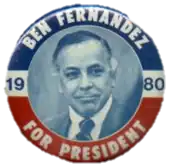 Withdrew: March 30 (endorsed Ronald Reagan) |
25,520
(0.20%) |
None | ||
| Harold Stassen |  |
Director of the United States Foreign Operations Administration (1953–1955) |
 Pennsylvania |
[data missing] | 25,425
(0.20%) |
None | |
| Bob Dole | .jpg.webp) |
U.S. Senator from Kansas (1969–1996) |
Kansas |
Withdrew: March 15 |
7,204
(0.06%) |
None | |
Withdrew before primaries
| Name | Born | Experience | Home state | Campaign announced |
Campaign suspended |
Campaign | Ref. |
|---|---|---|---|---|---|---|---|
 Larry Pressler |
March 29, 1942 (age 37) Humboldt, South Dakota |
U.S. Senator from South Dakota U.S. Representative from South Dakota |
[data missing] | January 8, 1980 | |||
 Lowell Weicker |
May 16, 1931 (age 48) Paris, France |
United States Senator from Connecticut |
[data missing] | May 16, 1979 |
Declined to run
The following potential candidates declined to run for the Republican nomination in 1980.[2][3]
- Frank Borman, former astronaut from Indiana and Chief Executive Officer of Eastern Air Lines
- Bill Brock, RNC Chairman of Tennessee; former Senator from Tennessee
- John Danforth, Senator from Missouri
- Pete du Pont, Governor of Delaware
- Gerald Ford, former President of the United States
- Spiro Agnew, former Vice President of the United States
- Jesse Helms, Senator from North Carolina
- Jack Kemp, U.S. Representative from New York
- Alexander Haig, former NATO Commander
- John Heinz, Senator from Pennsylvania
- Charles Mathias, Senator from Maryland
- Charles Percy, Senator from Illinois
- Elliot Richardson, former United States Secretary of Commerce
- William Ruckelshaus, former Director of the Federal Bureau of Investigation
- Richard Schweiker, Senator from Pennsylvania; presumptive running mate of Ronald Reagan in 1976
- Bill Simon, former United States Secretary of the Treasury (endorsed Reagan)[4]
- Jim Thompson, Governor of Illinois
Polling
National polling
| Poll source | Publication date | ||||||||
|---|---|---|---|---|---|---|---|---|---|
| Gallup[5] | Aug. 1977 | – | 8% | – | – | – | 20% | 33% | 3% |
| Gallup[5] | Apr. 1978 | – | 11% | – | 4% | 4% | 40% | 30% | 4% |
| Gallup[5] | July 1978 | – | 9% | 1% | 5% | 4% | 37% | 31% | 5% |
| Gallup[5] | Dec. 1978 | 1% | 9% | 1% | 6% | 1% | 24% | 40% | 11%[lower-alpha 1] |
| Gallup[5] | Apr. 1979 | 2% | 8% | 1% | 12% | 1% | 26% | 31% | 11%[lower-alpha 2] |
| Gallup[5] | May 1979 | – | 10% | – | 8% | 3% | 27% | 28% | – |
| Gallup[5] | June 1979 | 0% | 11% | 0% | 5% | 0% | 29% | 37% | 5% |
| Gallup[5] | July 1979 | 3% | 11% | 1% | 9% | 2% | 27% | 32% | 15%[lower-alpha 3] |
| Gallup[5] | Aug. 1979 | 1% | 10% | 3% | 8% | 1% | 21% | 29% | 16%[lower-alpha 4] |
| Gallup[5] | Nov. 1979 | 1% | 14% | 2% | 10% | 3% | 22% | 33% | 15%[lower-alpha 5] |
| Gallup[5] | Nov. 1979 | 0% | 11% | 5% | 8% | 3% | 24% | 40% | — |
| Gallup[5] | Dec. 1979 | 1% | 9% | 7% | 10% | 4% | 18% | 40% | 10%[lower-alpha 6] |
| Gallup[5] | Jan. 1980 | 3% | 9% | 9% | 9% | 0% | 27% | 33% | — |
| Gallup[5] | Jan. 1980 | 0% | 6% | 28% | 7% | 0% | 18% | 29% | — |
| Gallup[5] | Feb. 1980 | 2% | 6% | 17% | 4% | 1% | 32% | 34% | 3%[lower-alpha 7] |
| Gallup[5] | Feb. 1980 | 3% | 7% | 16% | – | – | 25% | 44% | — |
- ↑ Including 1% for Phil Crane.
- ↑ Including 2% for Phil Crane.
- ↑ Including 2% for Phil Crane.
- ↑ Including 1% each for Phil Crane, Benjamin Fernandez, and Harold Stassen.
- ↑ Including 1% each for Phil Crane, Benjamin Fernandez, and Harold Stassen.
- ↑ Including 1% each for Phil Crane, Benjamin Fernandez, and Harold Stassen.
- ↑ 1% each for Phil Crane, Benjamin Fernandez, and Harold Stassen.
Primary race
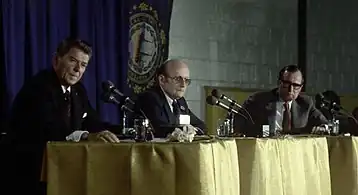 The Nashua debate between Reagan and Bush
The Nashua debate between Reagan and Bush.jpg.webp) A Chicago debate with Philip Crane, Bush, moderator Eric Sevareid, Reagan, and John B. Anderson
A Chicago debate with Philip Crane, Bush, moderator Eric Sevareid, Reagan, and John B. Anderson
Ronald Reagan, who had narrowly lost the 1976 Republican nomination to President Gerald Ford, was the early odds-on favorite to win the nomination in 1980. He was so far ahead in the polls that campaign director John Sears decided on an "above the fray" strategy. He did not attend many of the multi-candidate forums and straw polls in the summer and fall of 1979.
George H. W. Bush, the former director of the Central Intelligence Agency and chairman of the Republican National Committee, did go to all the so-called "cattle calls", and began to come in first at a number of these events. Along with the top two, a number of other Republican politicians entered the race.
In January 1980, the Iowa Republicans decided to have a straw poll as a part of their caucuses for that year. Bush defeated Reagan by a small margin. Bush declared he had "the Big Mo", and with Reagan boycotting the Puerto Rico primary in deference to New Hampshire, Bush won the territory easily, giving him an early lead going into New Hampshire.
With the other candidates in single digits, the Nashua Telegraph offered to host a debate between Reagan and Bush. Worried that a newspaper-sponsored debate might violate electoral regulations, Reagan subsequently arranged to fund the event with his own campaign money, inviting the other candidates to participate at short notice. The Bush camp did not learn of Reagan's decision to include the other candidates until the debate was due to commence. Bush refused to participate, which led to an impasse on the stage. As Reagan attempted to explain his decision, Jon Breen, the editor of the Nashua Telegraph and debate moderator, ordered Bob Malloy, the volume operator, to mute Reagan's microphone. When Malloy refused, Breen repeated his order. A visibly angry Reagan responded, "I am paying for this microphone, Mr. Green!" [sic] (referring to the editor and debate moderator Jon Breen).[6][7][8] Eventually the other candidates agreed to leave, and the debate proceeded between Reagan and Bush. Reagan's quote was often repeated as "I paid for this microphone!" and dominated news coverage of the event; Reagan sailed to an easy win in New Hampshire.[9]
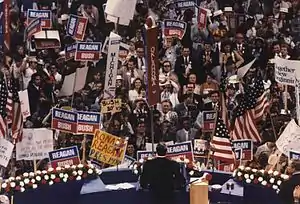
Lee Bandy, a writer for the South Carolina newspaper The State stated that heading into the South Carolina primary, political operative Lee Atwater worked to engineer a victory for Reagan: "Lee Atwater figured that Connally was their biggest threat here in South Carolina. So Lee leaked a story to me that John Connally was trying to buy the black vote. Well, that story got out, thanks to me, and it probably killed Connally. He spent $10 million for one delegate. Lee saved Ronald Reagan's candidacy."[10]
Reagan swept the South, and although he lost five more primaries to Bush—including the Massachusetts primary in which he came in third place behind John B. Anderson—the former governor had a lock on the nomination very early in the season. Reagan said he would always be grateful to the people of Iowa for giving him "the kick in the pants" he needed.
Reagan was an adherent to a policy known as supply-side economics, which argues that economic growth can be most effectively created using incentives for people to produce (supply) goods and services, such as adjusting income tax and capital gains tax rates. Accordingly, Reagan promised an economic revival that would benefit all sectors of the population. He said that cutting tax rates would actually increase tax revenues because the lower rates would cause people to work harder as they would be able to keep more of their money. Reagan also called for a drastic cut in "big government" and pledged to deliver a balanced budget for the first time since 1969. In the primaries Bush called Reagan's economic policy "voodoo economics" because it promised to lower taxes and increase revenues at the same time.
Results
| Date (daily totals) |
Contest | Total pledged delegates | ||||||
|---|---|---|---|---|---|---|---|---|
| Delegates won and popular vote | ||||||||
| Ronald Reagan | George Bush | John B. Anderson | Howard Baker | Others | Total vote | |||
| January 21 | Iowa caucus | 38 | 12 31,348 |
13 33,530 |
4,585 |
6 16,216 |
8 20,372 |
106,051 |
| February 2 | Arkansas convention | 22 | 9 | 8 | 0 | 0 | 5 | |
| February 17 | Puerto Rico primary | 20 | — | 14 111,940 |
— | 68,934 |
5,497 |
186,371 |
| February 22 | Alaska caucus | 20 | 12 1,789 |
5 818 |
0 |
34 |
3 459 |
3,100 |
| February 26 | New Hampshire primary | 23 | 13 72,983 |
6 33,443 |
14,458 |
3 18,943 |
6,707 |
146,534 |
| March 4 | Massachusetts primary | 46 | 15 115,334 |
16 124,365 |
16 122,987 |
19,366 |
18,771 |
400,823 |
| Vermont | 20 | 6 19,720 |
5 14,226 |
6 19,030 |
3 8,055 |
4,580 |
65,611 | |
| March 8 | South Carolina primary | 28 | 15 78,854 |
4 21,458 |
0 |
753 |
8 42,287 |
143,352 |
| March 11 (126) |
Alabama primary | 31 | 23 146,042 |
8 53,232 |
0 |
1,963 |
7,564 |
208,800 |
| Florida primary | 55 | 36 345,093 |
19 185,527 |
56,447 |
6,294 |
20,224 |
613,585 | |
| Georgia primary | 40 | 34 146,500 |
6 25,293 |
16,853 |
1,571 |
9,953 |
200,170 | |
| March 18 | Illinois | 103 | 52 547,355 |
12 124,057 |
39 415,193 |
7,051 |
36,425 |
1,130,081 |
| March 25 | Connecticut | 38 | 14 61,735 |
16 70,367 |
9 40,354 |
2,446 |
7,382 |
182,284 |
| New York primary | 127[lower-alpha 1] | 71 | 8 | 1 | 0 | 43 | ||
| April 1 | Kansas | 34 | 23 177,988 |
5 35,408 |
7 51,493 |
3,603 |
14,147 |
282,639 |
| Wisconsin | 37 | 15 364,898 |
11 276,164 |
10 248,623 |
3,298 |
9,919 |
902,902 | |
| April 5 | Louisiana | 34 | 27 31,212 |
7 7,818 |
0 |
– | 2,653 |
41,683 |
| April 19 | Maine | 23 | 3 | 17 | 0 | 0 | 3 | |
| April 22 | Pennsylvania | 85 | 39 527,916 |
46 626,759 |
30,848 |
— | 26,311 |
1,211,834 |
| May 3 | Arizona | 31 | 31 | 0 | 0 | 0 | 0 | |
| Missouri | 40 | 27 | 0 | 0 | 0 | 13 | ||
| Oklahoma | 38 | 34 | 0 | 0 | 0 | 4 | ||
| Texas | 82 | 42 268,169 |
40 250,219 |
– | – | 8,112 |
526,500 | |
| May 6 | Washington, D.C. | 13 | 0 |
9 4,973 |
4 2,025 |
– | 531 |
7,529 |
| Indiana | 56 | 46 419,556 |
10 92,955 |
56,342 |
— | — | 568,853 | |
| North Carolina | 43 | 33 113,854 |
10 36,631 |
8,542 |
2,543 |
6,821 |
168,391 | |
| Tennessee | 34 | 27 144,625 |
7 35,274 |
8,722 |
10 |
6,589 |
195,210 | |
| May 13 | Maryland | 45 | 24 80,557 |
21 68,389 |
16,244 |
— |
2,113 |
167,303 |
| Nebraska | 27 | 22 155,995 |
5 31,380 |
11,879 |
– |
2,882 |
202,136 | |
| May 20 (116) |
Michigan | 85 | 30 189,184 |
55 341,998 |
48,947 |
– |
15,047 |
595,176 |
| Oregon | 31 | 17 170,449 |
11 109,210 |
3 32,118 |
– |
2,324 |
314,101 | |
| May 27 | Idaho | 23 | 23 111,868 |
5,416 |
13,130 |
– |
4,465 |
134,879 |
| Kentucky | 31 | 31 78,601 |
6,869 |
4,791 |
– |
5,068 |
95,329 | |
| Nevada | 20 | 18 39,352 |
3,078 |
– |
– |
2 4,965 |
47,395 | |
| June 3 | California | 171 | 146 2,057,923 |
125,113 |
25 349,315 |
– | 31,707 |
2,564,058 |
| Mississippi | 25 | 25 (89%) |
(8%) |
– | — | (0%) |
||
| Montana | 23 | 23 68,744 |
7,665 |
– | – | 3,014 |
79,423 | |
| New Jersey | 70 | 58 225,959 |
12 45,447 |
– | – | 4,571 |
275,977 | |
| New Mexico | 23 | 16 37,982 |
5,892 |
3 7,171 |
– | 4 8,501 |
59,546 | |
| Ohio | 79 | 62 615,233 |
17 164,485 |
– | – | — | 779,719 | |
| Rhode Island | 16 | 13 3,839 |
3 962 |
– | – | 503 |
5,304 | |
| South Dakota | 23 | 23 72,861 |
3,691 |
– | – | 6,353 |
82,905 | |
| West Virginia | 22 | 19 115,407 |
3 19,509 |
– | – | 3,100 |
138,016 | |
| 2,152 | 1,222 7,637,219 |
637 3,102,808 |
128 1,549,249 |
20 191,935 |
99 541,342 |
12,830,618 | ||
Nationwide
Primaries, total popular vote:[11]
- Ronald Reagan – 7,709,793 (59.79%)
- George H. W. Bush – 3,070,033 (23.81%)
- John B. Anderson – 1,572,174 (12.19%)
- Howard Baker – 181,153 (1.41%)
- Phil Crane – 97,793 (0.76%)
- John B. Connally – 82,625 (0.64%)
- Unpledged – 68,155 (0.53%)
- Ben Fernandez – 25,520 (0.20%)
- Harold Stassen – 25,425 (0.20%)
- Gerald Ford – 10,557 (0.08%)
- Bob Dole – 7,204 (0.06%)
The Republican National Convention was held in Detroit, Michigan, from July 14 to July 17, 1980.
Endorsements
Ronald Reagan
- New Hampshire Union Leader of Manchester, New Hampshire[12]
- Former Governor Deane C. Davis of Vermont[13]
- Senator Bob Dole of Kansas (former candidate)[14]
- State Senator and former Representative Donald "Buz" Lukens of Ohio[15]
- Representative Thomas N. Kindness of Ohio[16]
John B. Connally, Jr.
- Senator Strom Thurmond of South Carolina[17]
- Governor Bill Clements of Texas[18]
- Senator Henry Bellmon of Oklahoma[19]
- Former Senator Clifford Hansen of Wyoming[20]
- Former Governor Tim Babcock of Montana[21]
- Mayor Buddy Cianci of Providence, Rhode Island[22]
- Former U.S. Postmaster General Winton M. Blount of Alabama[23]
- Former U.S. Attorney General Herbert Brownell of New York[24]
- Former RNC Chair Leonard Hall of New York[25]
- Former NY Attorney General Louis J. Lefkowitz of New York[26]
- Retired Admiral Thomas Hinman Moorer, former Chairman of the Joint Chiefs of Staff, of Maryland[27]
- NASCAR driver Richard Petty of North Carolina[28]
- Future Mississippi Governor Haley Barbour[29]
George H. W. Bush
- Former State Representative Francis W. Hatch Jr. of Massachusetts[30]
- Former United States Attorney General and Commerce Secretary Elliot Richardson of Massachusetts[31]
- Former Senator, Ambassador and 1960 Republican Vice-Presidential nominee Henry Cabot Lodge Jr. of Massachusetts[32]
- Former Senator Robert Taft Jr. of Ohio[33]
- Former Senator and U.S. Attorney General William B. Saxbe of Ohio[34]
John B. Anderson
- Middlesex County Sheriff John J. Buckley of Massachusetts[35]
- State Representative Paul Cellucci of Massachusetts[36]
- Former Senator Edward Brooke of Massachusetts[37]
- Representative Jim Jeffords of Vermont[38]
- Representative Pete McCloskey of California[39]
- Representative Paul Findley[40]
- Representative David F. Emery[40]
- The Hutchinson News of Hutchinson, Kansas[41]
Howard Baker
- Former Governor Walter R. Peterson Jr. of New Hampshire[42]
- State Attorney General Thomas D. Rath[43]
- Former Representative Perkins Bass[44]
- Senator William Cohen[40]
- Governor Richard A. Snelling of Vermont[45]
Phil Crane
See also
Notes
- ↑ Votes cast for delegate slates by CD, not for candidates
References
- ↑ "Reagan Maneuvering His Bandwagon," Washington Post, April 18, 1980.
- ↑ Sidey, Hugh (29 May 1978). "The Presidency: Roses with a Touch of Ragweed". Time.
- ↑ "Republicans: There's Life in the Old Party Yet". time. 15 November 1976.
- ↑ Clymer, Adam (March 8, 1979). "Backers of Reagan Open His Campaign". New York Times. p. A18. Retrieved 20 March 2020.
- 1 2 3 4 5 6 7 8 9 10 11 12 13 14 15 16 "US President - R Primaries". OurCampaigns.com. 16 Nov 2004. Retrieved 29 Oct 2020.
- ↑ "Reagan's Nashua Moment"
- ↑ "Nation: We Were Sandbagged". Time. 10 March 1980.
- ↑ "Molloy Sound and Video Contractors: Articles (1/1/11)". Molloysoundandvideo.com. 2000-02-10. Retrieved 2011-01-22.
- ↑ Dunham, Richard (20 October 2009). "New book tells inside story of pivotal Bush-Reagan debate in Nashua". The Houston Chronicle.
- ↑ Forbes, Stefan (2008). "Transcript – Boogie Man: The Lee Atwater Story". PBS Frontline.
- ↑ "US President - R Primaries Race - Feb 17, 1980". Our Campaigns. Retrieved 2012-02-03.
- ↑ "1980 New Hampshire Republican Primary". Our Campaigns. Retrieved 21 April 2020.
- ↑ "1980 Vermont Republican Primary". Our Campaigns. Retrieved 21 April 2020.
- ↑ "1980 Kansas Republican Primary". Our Campaigns. Retrieved 21 April 2020.
- ↑ "1980 Ohio Republican Primary". Our Campaigns. Retrieved 21 April 2020.
- ↑ "1980 Ohio Republican Primary". Our Campaigns. Retrieved 21 April 2020.
- ↑ "1980 South Carolina Republican Primary". Our Campaigns. Retrieved 21 April 2020.
- ↑ "1980 New Hampshire Republican Primary".
- ↑ "1980 New Hampshire Republican Primary".
- ↑ "1980 New Hampshire Republican Primary".
- ↑ "1980 New Hampshire Republican Primary".
- ↑ "1980 New Hampshire Republican Primary".
- ↑ "1980 New Hampshire Republican Primary".
- ↑ "1980 New Hampshire Republican Primary".
- ↑ "1980 New Hampshire Republican Primary".
- ↑ "1980 New Hampshire Republican Primary".
- ↑ "1980 New Hampshire Republican Primary".
- ↑ "Some race car drivers have become so successful they have become capitalists". The Boston Globe. February 13, 1980.
- ↑ https://web.archive.org/web/20110221004153/http://www.whorunsgov.com/Profiles/Haley_Barbour
- ↑ "1980 Massachusetts Republican Primary". Our Campaigns. Retrieved 21 April 2020.
- ↑ "1980 Massachusetts Republican Primary". Our Campaigns. Retrieved 21 April 2020.
- ↑ "1980 Massachusetts Republican Primary". Our Campaigns. Retrieved 21 April 2020.
- ↑ "1980 Ohio Republican Primary". Our Campaigns. Retrieved 21 April 2020.
- ↑ "1980 Ohio Republican Primary". Our Campaigns. Retrieved 21 April 2020.
- ↑ "1980 Massachusetts Republican Primary". Our Campaigns. Retrieved 21 April 2020.
- ↑ "1980 Massachusetts Republican Primary". Our Campaigns. Retrieved 21 April 2020.
- ↑ "1980 Massachusetts Republican Primary". Our Campaigns. Retrieved 21 April 2020.
- ↑ "1980 Vermont Republican Primary". Our Campaigns. Retrieved 21 April 2020.
- ↑ "McCloskey Buries the Hatchet by Endorsing Reagan". September 26, 1980.
- 1 2 3 "John Anderson: The Nice Guy Syndrome". February 1980.
- ↑ "1980 Kansas Republican Primary". Our Campaigns. Retrieved 21 April 2020.
- ↑ "1980 New Hampshire Republican Primary". Our Campaigns. Retrieved 21 April 2020.
- ↑ "1980 New Hampshire Republican Primary". Our Campaigns. Retrieved 21 April 2020.
- ↑ "1980 New Hampshire Republican Primary". Our Campaigns. Retrieved 21 April 2020.
- ↑ "1980 Vermont Republican Primary". Our Campaigns. Retrieved 21 April 2020.
- ↑ "1980 Georgia Republican Primary". Our Campaigns. Retrieved 21 April 2020.
.jpg.webp)
